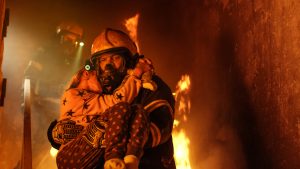
Just a day after the anniversary of the 9/11 terrorist attacks, the House approved legislation introduced by U.S. Rep. Chris Collins (R-NY) to track occurrences of cancer in firefighters through a Centers for Disease Control and Prevention (CDC) database.
The Firefighter Cancer Registry Act, H.R. 931, aims to close research gaps pertaining to the long-term health impacts of firefighting. The measure passed with unanimous consent, and U.S. Reps. Barbara Comstock (R-VA), Bill Pascrell (D-NJ) and Greg Walden (R-OR) spoke in support of the measure.
Collins noted the heroic actions of America’s first responders working and volunteering in the days after Sept. 11, 2001. “We lost many first responders during those attacks of 9/11 and we continue to lose more every year from ongoing health effects.”
The prevalence of cancer and cancer-related deaths is higher among firefighters, a 2015 study by the National Institute for Occupational Safety and Health (NIOSH) found. The study’s findings were based on a small sample size, however, and a comprehensive database would close research gaps.
“After NIOSH’s 2015 study, it was clear something needed to be done to ensure our nation’s firefighters had the best resources and equipment available to mitigate potential future health risks,” Collins said. “This bill will help us study this deadly trend and the information we gather will determine what needs to be done to improve safety protocols for these brave men and women.”
H.R. 931 would direct $2 million in federal funding to establish and maintain the database from fiscal years 2018 to 2022. The database would include data on cancer risk factors, job-specific details, years of service, fire calls answered and types of incidences.
“Passage of the Firefighter Cancer Registry Act is a major step towards improving the health and safety of our brave firefighters across the nation who head into danger despite the risks and keep our communities safe,” Pascrell, who co-authored the bill with Collins, said. “The least we can do is seek to better understand the connections between the job firefighters do and risk of cancer, so we can then help mitigate those risks.”
Comstock said she was pleased to see the bill pass the House, noting that the registry would be the first of its kind.
“The registry will let researchers better study the relationship between hazardous toxins often found in smoke to the spread of cancer,” Comstock said. “By studying these cancers and their effects on firefighters it is hoped we can also devise better protective equipment and technologies for our brave first responders.”
Walden, the chairman of the House Energy and Commerce Committee, said the registry would help improve the quality of life for those who dedicate their lives to helping others.
“Coming from a region of the country currently being ravaged by wildfires, I am constantly appreciative of the men and women who go into these dangerous situations of fire and smoke to protect others,” Walden said. “This national registry is another way for us to do more to protect them.”



